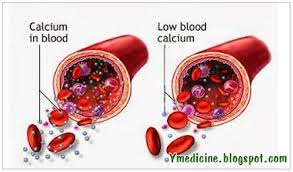If your results show higher than normal calcium levels, it may indicate:
- Hyperparathyroidism, a condition in which your parathyroid glands produce too much parathyroid hormone
- Paget's disease of the bone, a condition that causes your bones to become too big, weak, and prone to fractures
- Overuse of antacids that contain calcium
- Excessive intake of calcium from vitamin D supplements or milk
- Certain types of cancer
If your results show lower than normal calcium levels, it may indicate:
- Hypoparathyroidism, a condition in which your parathyroid glands produce too little parathyroid hormone
- Vitamin D deficiency
- Magnesium deficiency
- Inflammation of the pancreas (pancreatitis)
- Kidney disease
If your calcium test results are not in the normal range, it doesn't necessarily mean that you have a medical condition needing treatment. Other factors, such as diet and certain medicines, can affect your calcium levels. If you have questions about your results, talk to your health care provider.



 Contact Us
Contact Us






 Hospitals
Hospitals
 Doctors
Doctors
 Diagnostic
Diagnostic
 Pharmacy
Pharmacy
 Health Tips
Health Tips
 Blog
Blog

























Comments